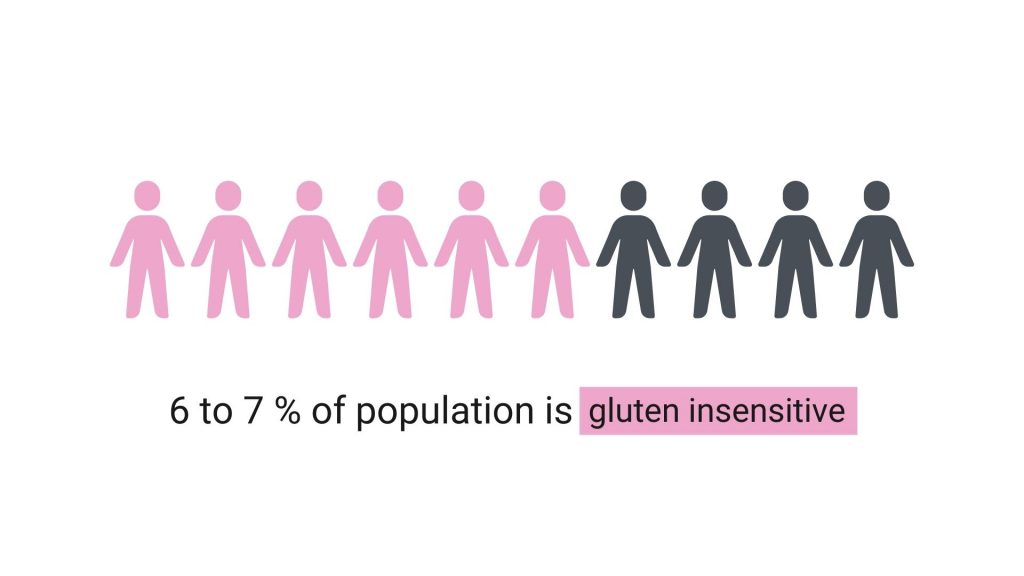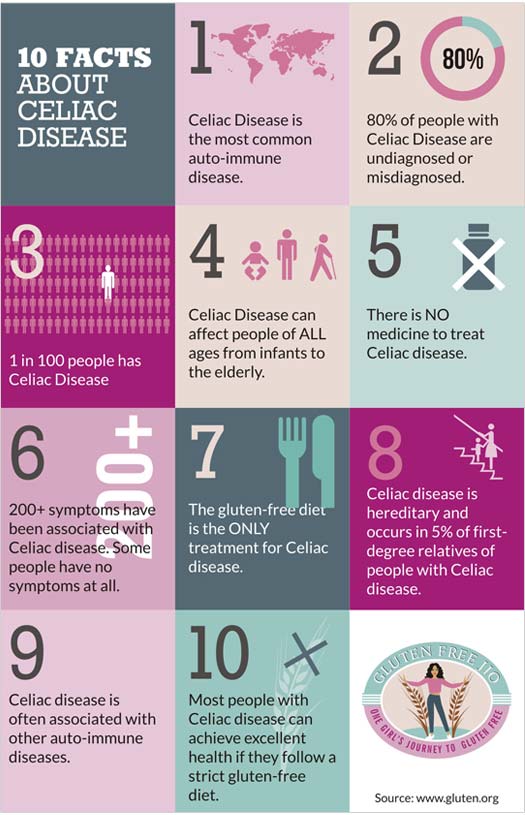Interesting Facts About Celiac Disease

Celiac disease is an autoimmune disease that affects your body’s ability to break down certain foods.
People with this disease get sick when they eat gluten-contained food like wheat, rye, and flour. These and other foods contain a protein called “gluten”. Gluten harms the small intestines of the person who has celiac disease. As a result, their bodies are not able absorb the nutrients from food.
Here is the list of 10 Facts About Celiac Disease you need to know for having a better understanding and awareness of this disease.
1 : Celiac disease is the most common autoimmune disease
Because celiac disease can lead to significant vitamin deficiencies, the condition can also affect the brain, peripheral nervous system, bones, liver, and other important organs.
Adults with celiac disease are also more predisposed to develop autoimmune disorders, intestinal cancer, type 1 diabetes, thyroid disease, bone disease, anemia, hypoglycemia, infertility, and liver disease.
Children with celiac disease display additional symptoms including delayed puberty, issues with tooth enamel and color, irritable behavior, growth delays, and poor weight gain.
It has been estimated that celiac affects 1 in 100 people worldwide. Two and a half million Americans remain untreated and at risk of long-term health problems.
Celiac disease can develop at any age after people start taking foods or medications that contain gluten. If Celiac disease does not get treated on time it can lead to various serious problems in the future.
2: 80% of people with celiac disease are undiagnosed or misdiagnosed
One of the most interesting facts about celiac disease is that 80% of people with celiac are either underdiagnosed or misdiagnosed
The study, published in the American Journal of Gastroenterology, also found that 1.6 million people in the United States follow a gluten-free diet despite never having been diagnosed with celiac disease.
Celiac disease is a digestive disorder that occurs in individuals who have a genetic predisposition to eating wheat, rye, and barley. This disorder can be treated with a gluten-free diet that eliminates gluten proteins.
The results show that about 80% of people who follow a gluten-free diet have not been diagnosed with celiac disease.
There are several factors due to which people with celiac remain undiagnosed or misdiagnosed.
→Awareness: Most people don’t even know about celiac disease, don’t have proper guidance, and have no idea about its treatment process,
Therefore, medical professionals need to be aware of the complications of celiac disease to make a proper diagnosis :
→Education: The knowledge and skills of in-house health workers are insufficient compared to the expectations of the health system, particularly in the provision of CD diagnosis and treatment services, apart from curriculum revisions, training of health workers to improve information and skills is urgently needed.
→Timely treatment: Due to the lack of knowledge and education in many cases the patient does not get the right treatment and cure and this disease becomes severe it has been seen that some the people died due to celiac disease A celiac person must get timely treatment and the right guidance
→Misconceptions: Society and people have many misconceptions about celiac disease and think that this disease is not as serious as others. However celiac patient is extremely sensitive to gluten and it can lead to a dangerous situation.
Know how celiac patients suffer and face different challenges and criticism to overcome this disease.
3: 1 in 100 people has Celiac Disease
Do you know that 1 in 100 people has Celiac disease?
According to the latest estimates by experts from the All India India Institute of Medical Sciences (AIIMS), More than 6-8 million population in India affects by celiac disease.
AIIMS doctors conducted a study of 23,000 people, of whom 0.6% (1 in 160) had celiac disease. It is more common in northern India (1.2 percent) than in the northeast (0.8 percent) and south (0.1 percent).
If we look globally, 1 in 100 people is affected with celiac disease. According to the data, celiac disease affects around three million Americans. More than 80% of American people with celiac disease are undiagnosed or unaware and suffer in vain.

4 : Celiac disease can affect people of all ages from infants to the elderly
Another surprising Celiac fact is that it can affect people of all ages.
Age and stage of life can play big a role in how long it takes to get an accurate diagnosis.
What is your age or where you are in life can also make it easy or harder for you to cope with living gluten-free.
Several symptoms can reveal celiac disease. However, the only way to diagnose it is via testing. There are different symptoms of celiac disease that appear in most or all age groups, and some symptoms are found in a specific age.
Symptoms of celiac disease can be appeared at any age, including diarrhea, gas, fatigue, liver, elevated enzymes or growth problems, etc.
When it comes to diagnosing celiac disease in infants, the symptoms are often first noticed by a parent or guardian.
In addition to the general symptoms listed above, babies may appear :
- Anorexia
- Fail to prosper
- Throw up
Since they cannot speak, it is harder to understand exactly what the baby is going through, the discomfort, or where the pain is. Mostly, parents know their baby is not well when the baby is irritating or the symptoms are obvious like Vomiting.
In the initial stage of a child they start learning to speak, their restricted vocabulary can make it challenging for parents, guardians, and health care providers to have a clear idea of what the child is experiencing symptoms.
Digestive problems such as flatulence or pale and uncomfortable bowel movements can be ruled out as less chronic diseases. Once properly diagnosed, transitioning a child to a gluten-free diet can be easy in some ways and difficult in others.
Diagnosing teens with celiac disease can be a lot easier for parents because they are more verbal and expressive, but some of the symptoms they experience can be lead to other factors. For example, migraines can be linked to hormonal fluctuations or bloating.
The symptoms of adults in their 20s may be identical to those who are in their 30s, 40s, and 50s, several factors can delay diagnosis.
5 : There is no medicine to treat celiac disease
There is no antidote available in the market which can permanently heal celiac however medical science is trying to find out the antidote which can heal celiac disease.
Doctors cure celiac disease by supporting people to stick to a gluten-free diet. Gluten is a protein that is found naturally in rye, grain, and wheat.
Gluten is filled in various products and beverages. For individuals who have celiac disease, eating gluten produce an abnormal reaction to their immune system which harm the small intestine.
It has been seen that the people who adhere gluten-free lifestyle their symptoms improve tremendously and most people follow a gluten-free diet to heal the harm and prevent the damage very quickly. People see a better lifestyle after following a gluten-free lifestyle
6 : 200+ symptoms have been associated with celiac disease. Some people have no symptoms at all
Most of cases celiac patients have the manifestation and symptoms of celiac can be different and vary between different ages and groups. Digestive indications and symptoms in adults include:
- Nausea and vomiting
- Stomach ache
- Fatigue
- Bloating
- Weight loss
- Diarrhea
- Constipation
However, many people have symptoms of celiac disease which are not related to celiac disease.
→Anemia, usually due to iron deficiency
→Loss of bone density (osteoporosis) or softening of bones (osteomalacia)
→Itchy rash with blisters (dermatitis herpetiformis)
→Headache and fatigue
→Joint pain
→Nervous system disorders including numbness and tingling in the legs and arms, possible balance problems, and cognitive impairment
There are more than 200 signs and symptoms of celiac disease, but most people with celiac disease have no symptoms.
However, it has been seen that people have celiac disease and some of the cases have no symptoms at all however they are also at a very high risk of long-term health problems as well.
7 : The gluten-free diet is the only treatment for celiac disease
A person suffering from gluten intolerance or celiac disease needs to live gluten-free to live a healthy life and needs to consult a doctor or specialist first.
If they choose the wrong diet, they can experience health problems due to allergic reactions. If you suffer from some of these gluten allergies, don’t worry because there is always a way.
A plan can be developed to meet your needs and lead a healthy life. All you have to do is watch out for grain products. You may think it’s not easy, but with a little help, you can find the right gluten-free diet for you.
If you are someone who loves oatmeal, there is no need to exclude oatmeal or oatmeal from your diet. We wish they had been treated to the harmful effects of wheat and other grains, but you need to read labels to make sure you’re not accidentally consuming gluten.
8 : Celiac disease is hereditary and occurs in 5 % of first degree relatives Of people with celiac disease
Here’s another interesting fact about Celiacs that will blow your mind.
According to experts, celiac disease is an autoimmune disease. however, experts also said that if your family history has a celiac disease you are more likely to get it from your family genes, family alone doesn’t examine whether you will develop celiac there are also other factors that contribute to celiac disease.
According to NCGS currently, it is not scientifically proven that there is a genetic component to gluten-free gluten sensitivity.
If a first-degree relative has celiac disease, your chances of having the disease are about 5 to 15%. If a second-degree relative has celiac disease, the odds are lower but still higher than if there were no relatives.
It is not sure that family history itself is an accurate factor in whether you will develop the celiac disease because celiac does not have an accurate inheritance pattern.
Having a family member who has been diagnosed with celiac disease is a good reason to talk to your doctor, who can help you determine if tests are needed.
If you’ve been diagnosed with celiac disease, telling your family members and offering to get tested can help them avoid or minimize the associated health complications.
9 : Celiac disease is cured once the symptoms go away
Celiac disease is an autoimmune disease that has no cure and can only be controlled by following a gluten-free diet. Even if the symptoms go away completely, adding gluten to your diet again can cause serious damage to the intestine again and can cause harmful effects on your body.
So even if you have celiac and after following the gluten-free diet you do not see any symptoms stick to the diet to remain healthy and fit.
10 : Celiac disease can occur at any age
Celiac can occur anytime between infancy and 90 years of age. Initially, it was conducted that only children were diagnosed with this disease however nowadays it has been suspected that most adults are being diagnosed with this disease all over the world.
Following are some the popular celebrities diagnosed with celiac:
These are some of the celebrities who have celiac disease and live a gluten-free lifestyle.
Watch the video to know some of the interesting facts about celiac disease.
Summary
If you have been diagnosed with celiac disease, your physician will recommend that to follow a gluten-free diet that eliminates all wheat, barley, rye, and oats. By removing gluten from your diet, you allow the intestinal villi to heal.
If you add a diverse diet, filled with nutrient-rich “superfoods” – especially vegetables – that have not been processed. You can live a healthy and happy life that is gluten-free and disease-free.
Below are the 10 Facts about Celiac Disease You Must Know

 MY JOURNEY
MY JOURNEY About Me
About Me Early life
Early life Diagnosis
Diagnosis CELIAC DISEASE
CELIAC DISEASE Symptoms & Diagnosis
Symptoms & Diagnosis Treatment & Follow Up
Treatment & Follow Up GLUTEN - FREE LIVING
GLUTEN - FREE LIVING At Home
At Home At School
At School At Social Events
At Social Events
 Grocery Shopping
Grocery Shopping COMMUNITY OUTREACH
COMMUNITY OUTREACH Gluten Free Meetup
Gluten Free Meetup Workshops
Workshops Webinars
Webinars COVID-19 Camps By Gluten Free Jio
COVID-19 Camps By Gluten Free Jio  Mid Day Meal
Mid Day Meal Beyond Celiac
Beyond Celiac Real Stories of Celiac
Real Stories of Celiac RESOURCES
RESOURCES Restaurant Dining Cards
Restaurant Dining Cards Recipes
Recipes Gluten Free eBook
Gluten Free eBook Gluten Free Jio App
Gluten Free Jio App RECOGNITION
RECOGNITION TRAVEL DIARY
TRAVEL DIARY



